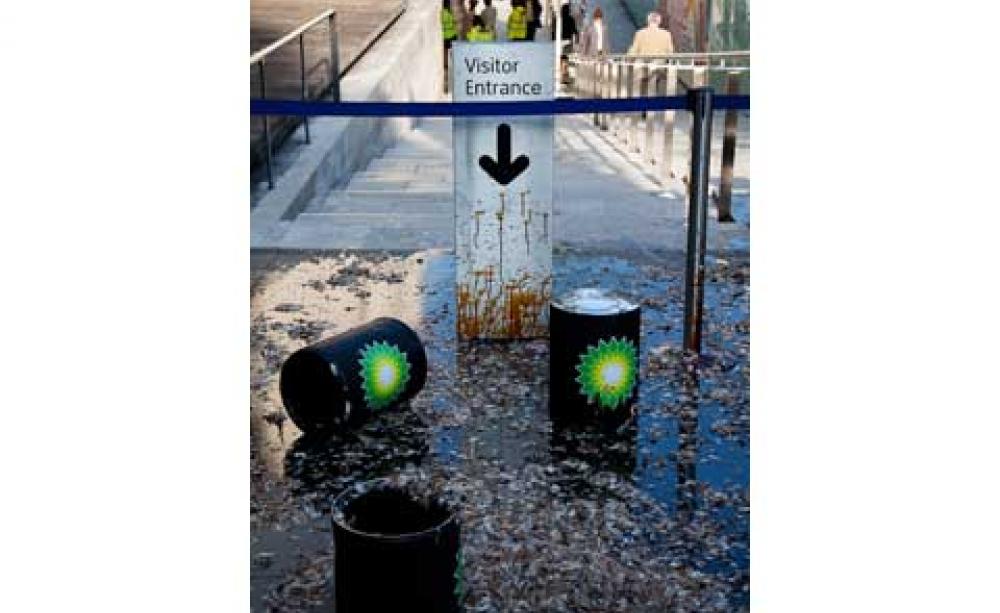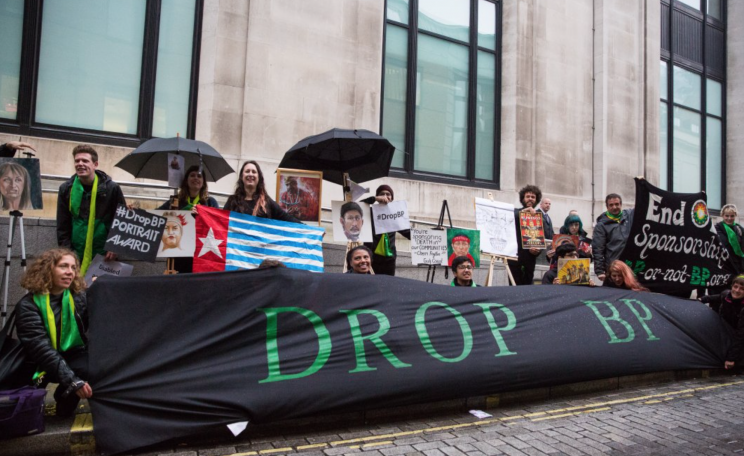James Marriott remembers the day he gathered up all the leaflets collected over the years from BP sponsored arts exhibitions. Leafing through a stack of exhibition material on Egypt to Iran and China, he thought, ‘Bloody hell, these are all the countries where BP has oil interests'.
The apparent overlap in BP's arts patronage and business interests is at the heart of Marriott's objection to cultural institutions accepting sponsorship from oil and gas companies. Greenwash is not the issue: ‘It's not manipulating consumers to rush off and buy more petrol. It's something off the radar,' he says. Marriott maintains arts sponsorships enables companies to get a one-up on their competitors by strengthening political alliances which create favourable terms for extraction contracts.
‘Shell sponsored a big exhibition of Russian landscape in the National Gallery. Major Russian ministers were there, as well as members of the Foreign Commonwealth Office. It's a way of creating a space for meeting and greeting which enables you to further your business,' he says.
Over the years, he says, the shoulder rubbing between the top brass in oil and gas and the arts have deepened a link - and an unhealthy dependence - between arts institutions and oil and gas patrons.
For Marriott, cultural institutions like the Tate and the British Museum are in the same league as debt financiers Royal Bank of Scotland (RBS), equity holders and insurance companies, in that in one way or another they are all driving forward fossil fuel extraction.
Pulling apart this ‘carbon web' is a major campaigning focus for the activist arts and education group Platform, which Marriott co-founded in 1984 with Dan Gretton.
Unconventional methods
With flat wages, no directors, and a rotating management board which anybody who's been with the organisation for over 9 months can come join, Platform is every bit as unconventional in its structure as in its campaign style.
‘Everybody runs the organisation together. We are very small so we couldn't really work without being able to draw upon a much greater field of people. We've got quite a lot of interns and we run a lot of campaigns in close collaboration with other people and organisations. You might be in Platform but working closer with somebody in another organisation than with your colleagues,' he says.
With just 10 campaigners hailing from a rare mix of arts, activism and education backgrounds, Platform is a ‘catalytic' organisation: its potency is in the knowledge base it has built up studying oil and gas issues for 15 years. It may provide the thinking and research behind high-profile campaigns, but it lacks the Greenpeace-like ‘threat' factor to carry them off.
Because it is a hybrid group, PLATFORM takes an arts-based perspective and consequently "we look at issues for as long as they need to be looked at rather than 'churning' our portfolio'' . It also chimes with Marriott's own artistic vision as a sculptor and writer: ‘Cezanne painted the same mountain all his life, why did he need to change? Samuel Beckett essentially wrote the same play again and again'.
But as Marriott is careful to point out, PLATFORM does not perform direct action themselves. 'We take delight in the fact that we have fluid identity, that some see us as a campaigning NGO, others see us as an arts group, and others see us as an education organisation. We are a combination of all these things' he says.
 Tackling the carbon web
Tackling the carbon web
‘London is one of the great engines of climate change - there is more CO2 produced here than in Portugal or Denmark, for example, but secondly here is the place that you finance fossil fuel extraction - if you want to dig a well in Indonesia you come here, a coal mine in Australia- you come here for the cash. This is the engine room of fossil fuel extraction. Our job, in oil and gas work, is fundamentally to change that.'
Platform has been involved in a wide breadth of collaborations in the past 15 years: with Greenpeace, WWF, FairPensions and the Co-op on campaigns to bring about shareholder resolutions and alongside People and Planet to prevent RBS going forward as the major financier of oil and gas development.
The ultimate aim is to drive a wedge between the carbon web of institutions - from major financiers, to the Foreign Office and Dfid, and, last but not least, the cultural institutions that lend weight to oil and gas companies.
Tate under fire
Last summer Platform launched the License to Spill campaign following performance demonstrations by the group Liberate Tate, who gathered black-clad, masked demonstrators outside the Tate Modern to pour buckets of molasses in a symbolic tar and feathering protest against BP's 20 years of sponsorship. 171 artists signed a letter in support the campaign - some of whose work is shown in the Tate, and Platform have followed up with an exhibition its own (see below for details).
While a similar campaign led by Art Not Oil and Rising Tide to force Shell out of its sponsorship of the Natural History Museum's Wildlife Photographer of the Year exhibition ended successfully, the BP-Tate relationship is altogether different.
Asked about the Tate-BP relationship by the Ecologist, the Tate responded: ‘BP is one of the most important sponsors of the arts in the UK supporting Tate as well as several other leading cultural institutions. The Board and Ethics committee regularly review compliance with the [2008 Ethics] policy. BP has worked with Tate since 1990 and fits within the guidelines of this policy. Its support has been instrumental in helping Tate develop access to the Tate Collection and to present changing displays of work by a wide range of artists in the national collection of British Art.'
Marriott's take is somewhat different: ‘No doubt about it, the Tate have been extremely anxious about what we've been doing. The art world is very small - in a way it's much more permeable than when campaigning against a big bank. It's been debated at board level several times, but it's going to take time. They, like BP, say well let's just sit these people out. The crux is the commercial moment. Once a deal has been signed between BP and Tate, the ability of pushing them out before it ends is nil. The key is making them think again before renewing a contract. We believe the contract is for 5 years, but we can't be certain. In fact, despite the fact it's a public institution, we've tried several times through the Freedom of Information Act to get details [of the sponsorship deal]. They won't give us it - saying it's commercially sensitive...'
Further information:
Liberate Tate exhibition and workshop on Saturday March 5th at Rich Mix, 35-47 Bethnal Green Road, London E1 6LA
Platform on Facebook and twitter: @platformlondon
End Oil Sponsorship of the Arts
Matilda Lee is the Ecologist's Community Affairs Editor
| READ MORE... | |
 |
HOW TO MAKE A DIFFERENCE Climate change needs persuasive art, not propaganda What is art's role in raising awareness of climate change? In this extract from her passionate, poetic essay 'The Far-seers of Art', Jay Griffiths explains why culture without nature is as good as worthless |
 |
VIDEO Spilling oil over the Tate: the activists' story 'Is it art?', a bystander asked of the demonstration against a ceremony at the Tate celebrating BP's support for British art. A good question - if it ain't, it's certainly effective |
 |
NEWS US plans to sue BP will 'not prevent future ecocide' US officials say they are determined to 'prevent future devastation' but campaigners say fines alone will not make oil and energy companies change risky behaviour |
 |
INTERVIEW Erik Assadourian: our society needs some serious cultural engineering The editor of the influential Worldwatch 'State of the World' report on the best ways to transform cultures from consumerism to sustainability |
 |
HOW TO MAKE A DIFFERENCE 10 groups pushing for cultural change Inspiration for change comes in many guises – from downshifting your personal life to celebrating a community Apple Day to joining a movement for social justice. |








